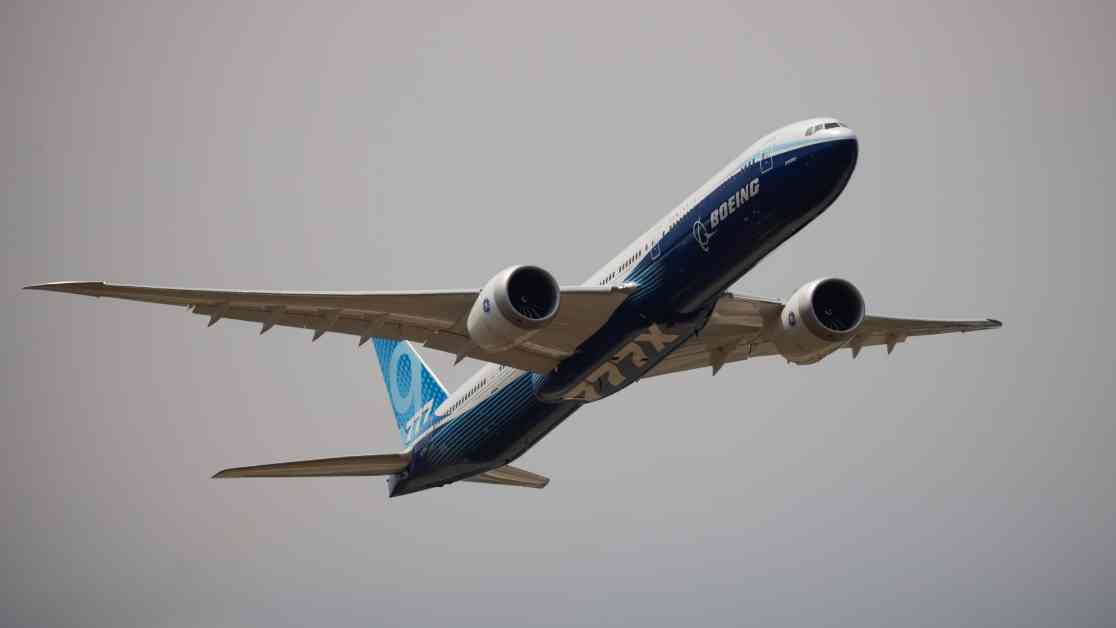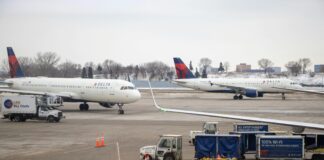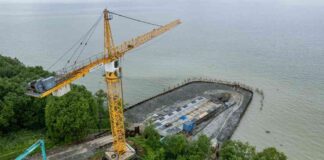Boeing’s highly anticipated 777X aircraft testing has hit a roadblock as the company recently announced a pause in flight tests due to structural damage. The issue was discovered during scheduled maintenance, leading to the grounding of the three other 777-9 airplanes in the test fleet. This setback comes at a crucial time for Boeing as they work towards certification and delivery of the new wide-body jetliners, which are currently slated for 2025, five years behind schedule.
Discovery of Structural Damage
Boeing revealed that the damage was found in a custom part located between the engine and the airplane structure. This particular component plays a critical role in the overall structural integrity of the aircraft, making it essential for safe and efficient flight operations. The discovery of this damage prompted the company to take immediate action by pausing flight tests and grounding the remaining test fleet to assess the situation further.
Impact on Certification and Delivery
One of the key concerns surrounding this development is how it will impact the certification and delivery timeline for the 777X aircraft. With 481 orders already in place for the wide-body jetliners, Boeing faces pressure to address the structural issues promptly to ensure the aircraft meets all safety and performance standards required for certification. Delays in testing and potential redesigns could further push back the delivery schedule, posing challenges for both Boeing and its customers eagerly awaiting the new aircraft.
Response from Boeing
In response to the structural damage, Boeing issued a statement reassuring stakeholders that their team is actively working to replace the damaged part and gather insights from the incident. The company emphasized its commitment to safety and quality, highlighting the importance of thorough testing and maintenance protocols to address any issues that may arise during the development process. Boeing also indicated that they have informed the Federal Aviation Administration and their customers about the situation, maintaining transparency and open communication throughout the process.
The grounding of the 777X test fleet comes as Boeing navigates through a turbulent period marked by safety concerns and operational challenges. The company’s new CEO, Kelly Ortberg, is tasked with steering Boeing towards a successful recovery following a series of setbacks, including the doorplug blowout incident earlier in the year. The latest development with the 777X aircraft adds to the pressure on Boeing’s leadership team to address issues swiftly and effectively to regain trust and confidence in their products and processes.
As Boeing works to address the structural damage and resume flight tests for the 777X aircraft, industry experts are closely monitoring the situation for any potential implications on the wider aviation sector. The 777X has been highly anticipated for its advanced features and improved performance capabilities, making it a key asset for airlines looking to modernize their fleets and enhance passenger experience. Any delays or setbacks in the certification and delivery of the aircraft could have ripple effects on the industry, impacting airlines, suppliers, and passengers alike.
Moving forward, Boeing will need to conduct a thorough investigation into the root cause of the structural damage and implement measures to prevent similar issues from occurring in the future. The company’s reputation and standing in the aviation industry hinge on their ability to address challenges effectively and deliver on their commitments to safety, quality, and innovation. The successful resolution of the 777X testing halt will be crucial in determining Boeing’s trajectory in the coming years as they strive to regain momentum and solidify their position as a leading aircraft manufacturer.
In conclusion, the halt in 777X aircraft testing due to structural damage presents a significant challenge for Boeing as they navigate through a critical phase in the development of the wide-body jetliners. The company’s response to the issue, including swift action, transparent communication, and commitment to safety, will be pivotal in determining the impact on certification, delivery, and overall industry dynamics. As stakeholders await further updates on the situation, the aviation community remains vigilant in monitoring developments and supporting Boeing in their efforts to overcome obstacles and achieve success in the competitive aerospace market.






















